GALLUP NEWS SERVICE
PRINCETON, NJ -- There has been little change in the public's overall attitudes toward the Iraq war and the administration's proposed plans for an increase in troops in the days following President George W. Bush's speech to the nation this past Wednesday. Americans continue to oppose, by a 59% to 38% margin, President Bush's plan to increase troops in Iraq. Americans remain unconvinced that it is necessary to send new troops to Iraq to gain victory, as Bush argued, and a majority favors withdrawal of troops within one year. Most Americans continue to say the costs of the war outweigh the benefits of succeeding in Iraq, and a majority of Americans also continue to say it was a mistake to send troops to Iraq initially.
Americans are split on the issue of congressional action that would block funds for the deployment of additional troops. Although, there is majority approval for a non-binding congressional resolution voicing opposition to the surge in troops.
These results are from the weekend USA Today/Gallup poll, conducted Jan. 12-14, 2007.
Support for a Surge
The most basic question included in the poll asked Americans to evaluate Bush's proposal to increase the number of U.S. troops in Iraq.
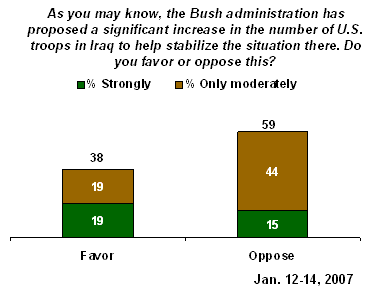
The results show virtually no change from a poll taken a week ago, on Jan. 5-7, 2007, before the president's speech. In that poll, a similarly worded question that included the phrasing "temporary" showed 36% of Americans favoring a troop increase and 61% opposing it. In short, the data give no indication that the speech and the discussion that followed -- including critiques from Democratic leaders -- had an impact on American attitudes in either direction.
Gallup's long-term trend measuring public opinion about U.S. troop levels provides respondents with four choices, as shown below:
Here are four different plans the U.S. could follow in dealing with the war in Iraq. Which ONE do you prefer -- [ROTATED: withdraw all troops from Iraq immediately, withdraw all troops by January 2008 -- that is, in 12 months' time, withdraw troops, but take as many years to do this as are needed to turn control over to the Iraqis, (or) send more troops to Iraq]?
|
|
Withdraw
|
Withdraw,
|
|
|
|
|
% |
% |
% |
% |
% |
|
|
2007 Jan 12-14 |
17 |
39 |
29 |
13 |
2 |
|
2007 Jan 5-7 |
15 |
39 |
31 |
12 |
2 |
|
2006 Oct 20-22 |
20 |
34 |
35 |
9 |
2 |
|
2006 Sep 15-17 |
17 |
31 |
42 |
9 |
2 |
|
2006 Jul 28-30 |
19 |
36 |
35 |
6 |
3 |
|
2006 Jul 21-23 |
19 |
33 |
38 |
7 |
2 |
|
2006 Jun 23-25 |
17 |
33 |
41 |
8 |
1 |
|
2006 Jun 9-11 |
17 |
32 |
42 |
6 |
3 |
|
2006 Mar 10-12 |
19 |
35 |
39 |
4 |
3 |
|
2005 Nov 11-13 |
19 |
33 |
38 |
7 |
3 |
Again, there has been no statistically significant change in comparison to polling conducted in the week prior to the speech. A majority of Americans -- 56% -- favor withdrawal of American troops within 12 months' time, another 29% favor withdrawal over time, but taking as much time as needed, while 13% favor sending in more troops.
From a broader perspective, there has been a gradual but slight increase in the percentage of Americans selecting the "send more troops" option, from a low point of 4% in March of last year to the current 13%. Overall, there has been essentially no change in this measure in the period of time that encompassed President Bush's speech.
Despite Bush's arguments in his speech, the majority of Americans say that the United States cannot achieve its goals in Iraq regardless of how many troops it has there. Only 28% agree with the administration's position that the U.S. can only achieve its goals if it increases the number of troops it has there, while 17% believe the U.S. can achieve its goals in Iraq without sending in more troops, and 50% say the U.S. cannot achieve its goals in Iraq regardless of how many troops it has there.
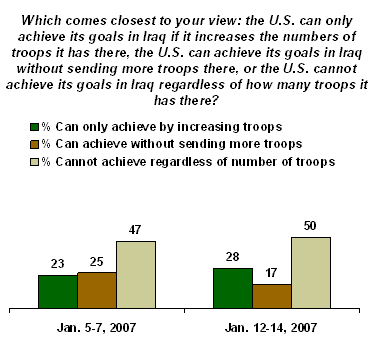
Congressional Action
There has been a good deal of discussion about the actions Democratic leaders in Congress could take to signal their opposition to the president's stated intentions to send more troops to Iraq.
Given the president's constitutional role as commander-in-chief of the armed forces, Congress has little recourse to stop the president from increasing troop levels should he decide to do so. Two primary options for actions Congress could take have been discussed, however. The first would involve the Democrats in Congress passing a non-binding resolution stating opposition to the increase in troops in Iraq. The second would be a more dramatic attempt to block funding for the increase in troops.
The weekend poll shows a majority of Americans favor the former, but that the public is split on the latter.
Here are the results of these two questions:
As you may know, the Democrats in Congress are considering passing a resolution to express their opposition to President Bush's plan to send more U.S. troops to Iraq. This resolution, by itself, would not affect Bush's policy, but the Democrats are hoping it will put pressure on him to change his policy. Do you favor or oppose the Democrats in Congress taking this action?
|
Favor |
Oppose |
No opinion |
|
|
2007 Jan 12-14 |
61% |
37 |
2 |
Would you favor or oppose the Democrats in Congress taking active steps to block the deployment of more U.S. troops to Iraq, such as denying the funding needed to send the additional troops?
|
Favor |
Oppose |
No opinion |
|
|
2007 Jan 12-14 |
47% |
50 |
3 |
Would you [favor/oppose] this strongly, or only moderately?
COMBINED RESPONSES (Q.15-16): BASED ON FULL SAMPLE
|
Strongly
|
Moderately
|
Moderately
|
Strongly
|
No
|
|
|
2007 Jan 12-14 |
33% |
14 |
15 |
35 |
3 |
Support for a non-binding resolution of opposition to the war essentially mirrors the pattern of support for the troop increase itself. This is not a surprising result, suggesting that Americans who oppose the troop surge would be quite willing to see Congress pass a resolution formally expressing that opposition.
Actions to actively block the deployment of more U.S. troops to Iraq are more controversial. While House Defense Appropriations Committee Chair John Murtha indicated on Sunday that he would introduce legislation to cut off funding for the troop increase, Senate Armed Forces Committee Chair Carl Levin has said that he opposes efforts to deny funding for the troop surge. Levin is quoted in Detroit News as saying: "I don't think funding is the way you approach this."
The American public is apparently just as torn on this issue as are Democratic leaders. Forty-seven percent favor and 50% oppose when Americans are asked their opinion about this action.
Benefits vs. Costs
The poll included an update on a key question asking Americans if the benefits to the United States of succeeding in Iraq outweigh the costs. This is essentially the argument being made by the administration -- that the costs of failure in Iraq are so high that any other alternative but to press for success is unacceptable.
However, the American public appears to disagree. By a better than two to one margin (65% to 31%), Americans say the "costs of succeeding in Iraq" outweigh the benefits of succeeding. This is almost identical to the results Gallup found when it asked this same question in December.
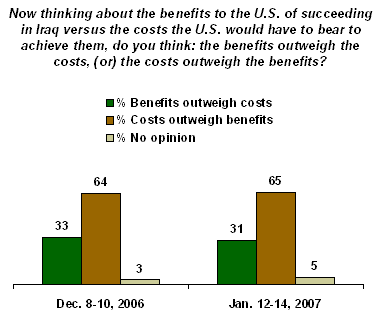
Views on this question, like most attitudes toward the war, vary greatly by party affiliation. A majority of Republicans, 57%, agree with the administration and say that the benefits of success outweigh the costs while 39% say the costs outweigh the benefits. Only 9% of Democrats say the benefits outweigh the costs while the vast majority, 85%, says the costs outweigh the benefits. Most independents say the costs outweigh the benefits. These results are quite similar to the December poll.
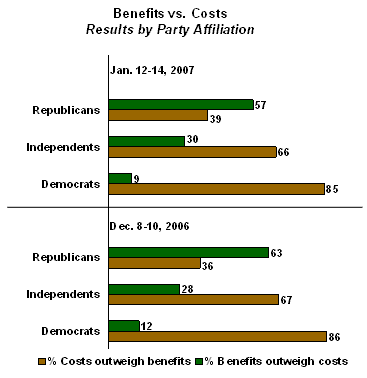
Mistake to Send Troops to Iraq?
One of Gallup's longest-running trend measures on the Iraq war is a simple question asking if, in light of the developments, the United States made "a mistake in sending troops to Iraq" or not.
The Jan. 12-14 update on this question finds that the events of the past week have had almost no change on this measure. Fifty-eight percent of Americans say it was a mistake to send troops to Iraq while 41% say it was not. Prior to the president's speech on Iraq, 57% of Americans said it was a mistake and 41% said it was not a mistake to send troops to Iraq.
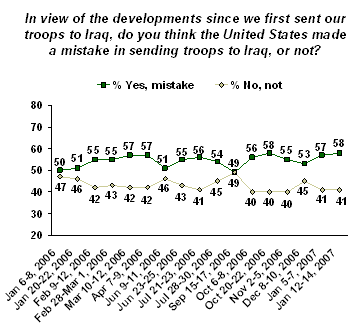
From a long-term perspective, Americans have grown more and more negative about the war in Iraq each year since it began. In 2003, an average of only 32% of Americans said it was a mistake to send troops to Iraq. This average jumped to 46% in 2004, to 51% in 2005, and to 55% in 2006. The average for the two polls conducted so far this year is slightly higher at 58%.
Survey Methods
Results are based on telephone interviews with 1,003 national adults, aged 18 and older, conducted Jan. 12-14, 2007. For results based on the total sample of national adults, one can say with 95% confidence that the maximum margin of sampling error is ±3 percentage points. In addition to sampling error, question wording and practical difficulties in conducting surveys can introduce error or bias into the findings of public opinion polls.
